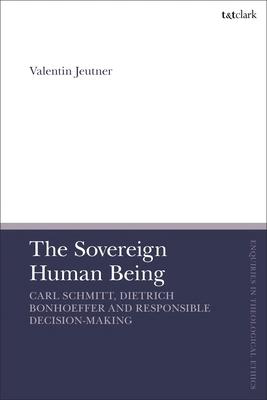Sovereign is who decides; and who decides is responsible. The book develops these two arguments by comparing Carl Schmitt's and Dietrich Bonhoeffer's theories of sovereignty.
Carl Schmitt was an influential jurist of Nazi Germany. Dietrich Bonhoeffer was a Lutheran priest hanged for his involvement in a plot to assassinate Adolf Hitler. In many ways, the two men could not be more different. But they both struggled with the question of how to maintain order and how to prevent violence at times of crisis. In this considered work, Jeutner brings these two thinkers into careful dialogue. They both agreed that order is established not by appealing to existing norms or general principles but by an individual's sovereign decision. Ascribing sovereignty to individuals communicates that they always have a choice and that they are always responsible for these choices. Thus, it is not just powerful individuals who have the choice to bring wars to an end or who can combat climate change. This exploratory work reveals that, by making sovereign decisions, ordinary individuals, too, can work towards the peaceful resolution of conflicts or reduce their carbon footprint. Making such sovereign decisions is not easy for individuals who are taught to follow orders and norms. For this reason, this book supplements the comparative analysis of Schmitt and Bonhoeffer with an action-guiding decision-making framework. While the proposed framework departs from Schmitt's and Bonhoeffer's theses by recognizing the agency, responsibility, and sovereignty of all individuals, Jeutner argues that this acknowledgement of the universal sovereignty of individuals is the only way to bring about the orderly and peaceful world of which Schmitt and Bonhoeffer dream.
Book
The Sovereign Human Being: Carl Schmitt, Dietrich Bonhoeffer and Responsible Decision-Making
(Write a Review)
Hardcover
$127.78
Sovereign is who decides; and who decides is responsible. The book develops these two arguments by comparing Carl Schmitt's and Dietrich Bonhoeffer's theories of sovereignty.
Carl Schmitt was an influential jurist of Nazi Germany. Dietrich Bonhoeffer was a Lutheran priest hanged for his involvement in a plot to assassinate Adolf Hitler. In many ways, the two men could not be more different. But they both struggled with the question of how to maintain order and how to prevent violence at times of crisis. In this considered work, Jeutner brings these two thinkers into careful dialogue. They both agreed that order is established not by appealing to existing norms or general principles but by an individual's sovereign decision. Ascribing sovereignty to individuals communicates that they always have a choice and that they are always responsible for these choices. Thus, it is not just powerful individuals who have the choice to bring wars to an end or who can combat climate change. This exploratory work reveals that, by making sovereign decisions, ordinary individuals, too, can work towards the peaceful resolution of conflicts or reduce their carbon footprint. Making such sovereign decisions is not easy for individuals who are taught to follow orders and norms. For this reason, this book supplements the comparative analysis of Schmitt and Bonhoeffer with an action-guiding decision-making framework. While the proposed framework departs from Schmitt's and Bonhoeffer's theses by recognizing the agency, responsibility, and sovereignty of all individuals, Jeutner argues that this acknowledgement of the universal sovereignty of individuals is the only way to bring about the orderly and peaceful world of which Schmitt and Bonhoeffer dream.Hardcover
$127.78